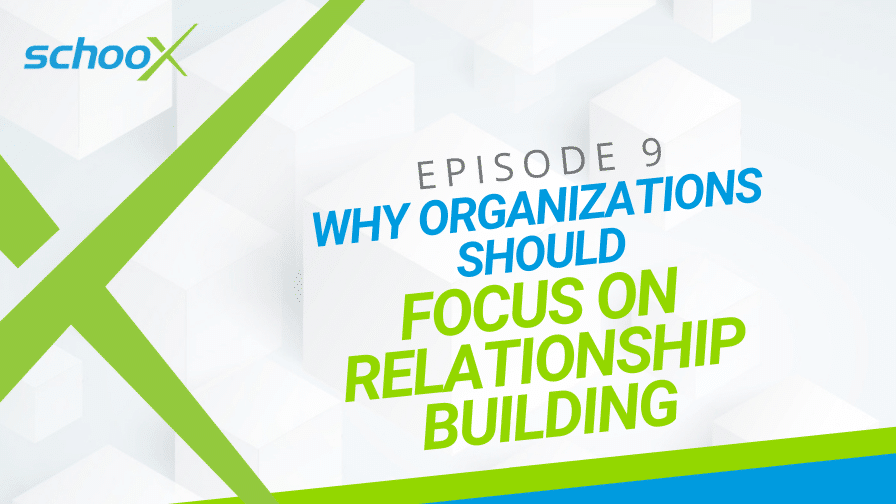December 10, 2020
5 Min. Read

What could better internal relationships help your organization achieve?
As many businesses move their communications online, internal relationships need to be actively nurtured in order to thrive.
Whether you are friends or colleagues, forming relationships with the click of a button rather than a handshake is common. While this can make you feel connected to your organization, a virtual relationship is very different from one forged in person. It needs intentional fostering to grow in the same way.
With better connection comes greater opportunities. Companies are beginning to focus on improving online communication, but what could you achieve by actively encouraging a relationship-building culture?
In this episode of The Learning Xchange, Schoox’s VP of Learning and Brand Success, Matthew Brown, examines the impact relationship building can have within a business. He looks at why organizations should intentionally focus on creating internal connections and their potential benefits.
Listen to this episode of the podcast below:
Or, keep reading to learn why organizations should focus on intentionally building relationships.
Why relationship building should be an intentional practice
Organizations regularly overlook the benefits of internal relationship building. But teaching employees how to network and engage with other individuals and departments is a business responsibility and necessity. Creating strong internal connections can improve internal workflows, make your workforce happier, and return great business results.
Here are three reasons why you should intentionally focus on relationship building within your organization.
1. Relationship building can help navigate change
Recently, more and more organizations have consolidated departments through restructuring. Learning and development is often the department that gets combined or consumed by others, such as HR, operations, or even legal and marketing. This can be a difficult transition for any department, but internal shifts like this can be more successful within a collaborative environment.
Creating a space for teams to work together can improve reactions to internal change. People can come together to mitigate adjustments and develop practices that help the organization adapt as a whole.
Navigating change management can be difficult. Whether it’s a big initiative or a small issue, leveraging a wider variety of relationships can help. Departments like HR and L&D usually try and create a connection with each team in the organization and are often the go-tos for integrating new changes. But what if all teams had the same approach? Changes would be much easier to implement and far more effective straight away.
L&D makes an intentional effort to grow their relationships. It’s not something that happens overnight. If all employees were encouraged to interact and nurture connections like L&D are, then more organizations would see success when implementing changes.
2. Cross-functional relationship building leads to business success
A good place to start these connections is by encouraging teams to work towards a unified goal. If two departments have similar aims, actively focus on growing a working relationship between them. This way, you can begin introducing a cross-functional company culture.
Take L&D and HR, for example. They both aim to integrate learning into the employee lifecycle. In some organizations, the two departments unite to achieve this goal by both agreeing to reinforce the same behaviors, skills, and more, in employees. This benefits the employees as they’re actively encouraged by two teams to work towards a goal. But it also benefits the departments, as they’ll have a better understanding of each other’s working practices.
Both these internal advantages have a huge impact on the business. The organization is more likely to see overall success with happier employees and more unified teams. To learn more about connecting HR and L&D departments, check out this post, How HR and L&D Can Build a Better Culture Together.
3. Relationship building improves your insights
When building something new or approaching a big decision, it’s beneficial to hear others’ thoughts. But if you only take the opinions of a small group of people or people who are all very similar, then you’re limiting your potential insights.
Having a broad range of insights is advantageous because it gives you a great vantage point to see any potential issues, obstacles, and what’s going to work. This is why many businesses have beta testers, focus groups, or find ways of eliciting feedback from employees to gain these informative insights.
However, to get someone’s honest opinion, they need to trust you. Feedback is not going to improve your product, service, or business if it’s not truthful. By focusing on building relationships, you can gain people’s trust and then access their honest thoughts.
Take a new training course you’re developing, for example. You want others to try it before you launch it outside of your business. You ask your team, but they’ve already worked closely on the project, and they all agree on what they do and don’t like about it.
This is a very limited way of getting insights. If you ask a similar group of people, you’re not able to get various perspectives as you would in the real world, and you’ll miss opportunities. So, it’s necessary that you reach out to a wider range of the employee population.
This doesn’t just mean building relationships with a cross-section of your organization. It means considering those who might have different perspectives, such as those who have differing:
- Roles within the organization
- Life experiences
- Personal and professional circumstances
- Nationalities and language preferences
- Accessibility challenges
- Performance levels
Being aware of other peoples’ insights can help lead to success. But remember that their insights are only accessible if you’re building a culture of communication. By actively nurturing relationships, people are more forthcoming to help and share their thoughts. So, you can ask more people to help you trial your training course, for example, and you might receive feedback that helps shape its development in ways you never expected.
Why relationship building is an investment in your business
Bringing people together is always going to benefit your business. But a focus on relationship building is crucial to success.
Relationships are vital to the heart of any organization. A business that nurtures and prioritizes relationships sets its employees up for a more enjoyable working experience. It also prepares the company for greater achievements overall. So, focus on networking, encourage employees to share their perspectives, and don’t overlook the importance of connection.
If you enjoyed this podcast episode summary, check out all The Learning Xchange episodes on your favorite podcast app and listen to them on the go!



